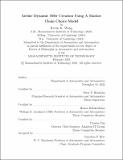Airline Dynamic Offer Creation Using A Markov Chain Choice Model
Author(s)
Wang, Kevin K.
DownloadThesis PDF (6.597Mb)
Advisor
Belobaba, Peter P.
Terms of use
Metadata
Show full item recordAbstract
Customers have become accustomed to real-time dynamic pricing and offer recommendations in retailing and e-commerce. Airline pricing and revenue management is falling behind with its one-size-fits-all approach, where all customers are offered the same static offers and prices. The airline industry developed a roadmap toward dynamic offer creation, which will enable airlines to dynamically bundle and price a set of offers that are customized to a shopping request.
Realizing this vision requires advancements in both distribution and science. On the distribution side, these advancements will come with the New Distribution Capability (NDC). On the science side – which is the focus of this dissertation – little progress has been made despite years of research. Along this roadmap, entirely new price optimization problems and revenue opportunities arise, for which no known solutions exist. For example, the optimization of both ancillary bundle offers and branded fare families becomes increasingly relevant as the airlines gain additional dynamic pricing capabilities.
We develop a novel approach to solve these dynamic offer creation problems using a Markov chain choice model (MCCM). We discover that it is particularly suited to solving the bundle pricing problem, which also has potential applications in other industries. We also extend the MCCM to solve joint pricing and assortment optimization problems and estimate MCCM parameters from realistic datasets that an airline could collect through price experimentation.
In simulations, we find that our model can increase both ancillary and total revenue over an a la carte baseline pricing model that mimics current industry practice. The MCCM has attractive properties – the resulting offer sets and prices discourage purchases of less profitable offers and nudge customers toward more profitable ones. Our model proposes offers that are most relevant to the customer.
Our research also identifies challenges of using the MCCM in practice. We find that parameter estimation becomes challenging with limited data and large offer sets. The assortment optimization problem is also more challenging to solve, given the number of possible offer sets. Our results contain important takeaways about the relative revenue benefits of offer set pricing and offer set selection, and when bundling is most effective.
Date issued
2023-02Department
Massachusetts Institute of Technology. Department of Aeronautics and AstronauticsPublisher
Massachusetts Institute of Technology